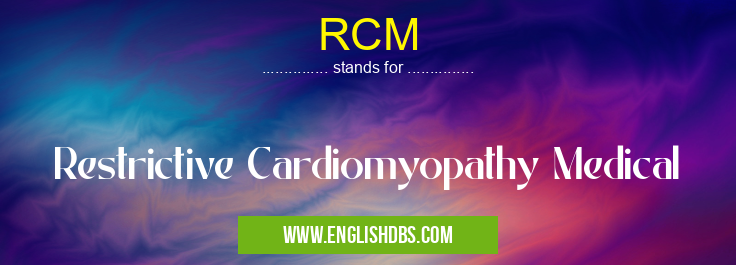What does RCM mean in MEDICAL
RCM stands for Restrictive Cardiomyopathy Medical. It is a rare form of cardiomyopathy, a disease of the heart muscle. In RCM, the heart muscle becomes stiff and unable to relax properly, making it difficult for the heart to fill with blood. This can lead to heart failure, a condition in which the heart is unable to pump enough blood to meet the body's needs.

RCM meaning in Medical in Medical
RCM mostly used in an acronym Medical in Category Medical that means Restrictive Cardiomyopathy Medical
Shorthand: RCM,
Full Form: Restrictive Cardiomyopathy Medical
For more information of "Restrictive Cardiomyopathy Medical", see the section below.
Symptoms of RCM
The symptoms of RCM can vary depending on the severity of the condition. Common symptoms include:
- Shortness of breath
- Fatigue
- Swelling in the legs, ankles, and feet
- Chest pain
- Rapid or irregular heartbeat
- Lightheadedness or fainting
Causes of RCM
The exact cause of RCM is often unknown. However, it can be caused by a variety of factors, including:
- Genetic factors: Some forms of RCM are caused by genetic mutations that affect the proteins that make up the heart muscle.
- Idiopathic: In many cases, the cause of RCM is unknown.
- Other medical conditions: RCM can also be caused by other medical conditions, such as:
- Amyloidosis
- Sarcoidosis
- Hemochromatosis
- Scleroderma
Diagnosis of RCM
RCM can be diagnosed through a variety of tests, including:
- Physical examination
- Echocardiogram
- Cardiac MRI
- Biopsy
Treatment of RCM
There is no cure for RCM, but treatment can help to manage the symptoms and improve the quality of life. Treatment options include:
- Medications: Medications can be used to reduce fluid retention, improve heart function, and control arrhythmias.
- Lifestyle changes: Lifestyle changes, such as eating a healthy diet and exercising regularly, can help to improve heart health and reduce symptoms.
- Surgery: In some cases, surgery may be necessary to correct structural abnormalities in the heart.
Essential Questions and Answers on Restrictive Cardiomyopathy Medical in "MEDICAL»MEDICAL"
What is Restrictive Cardiomyopathy (RCM)?
RCM is a heart condition where the heart muscle becomes stiff and unable to relax properly. This stiffness prevents the heart from filling with enough blood, leading to reduced blood flow to the body.
What are the symptoms of RCM?
Symptoms of RCM can include shortness of breath, fatigue, swelling in the legs and abdomen, chest pain, and irregular heartbeat.
What causes RCM?
RCM can be caused by a variety of factors, including genetic mutations, certain diseases (such as sarcoidosis or amyloidosis), infections, and toxins.
How is RCM diagnosed?
RCM is diagnosed through a physical exam, echocardiogram (ultrasound of the heart), and blood tests.
How is RCM treated?
Treatment for RCM focuses on managing symptoms and preventing complications. This may include medications to improve heart function, diuretics to reduce fluid buildup, and lifestyle changes such as a low-sodium diet and exercise program. In severe cases, a heart transplant may be necessary.
What is the prognosis for RCM?
The prognosis for RCM varies depending on the underlying cause and severity of the condition. With proper treatment, many people with RCM can live full and active lives.
What are the risks associated with RCM?
RCM can increase the risk of heart failure, stroke, and sudden cardiac death.
What can I do to prevent RCM?
While not all cases of RCM can be prevented, maintaining a healthy lifestyle, managing underlying diseases, and avoiding toxins can help reduce the risk.
Final Words: RCM is a rare but serious condition that can lead to heart failure. The exact cause of RCM is often unknown, but it can be caused by a variety of factors, including genetic mutations and other medical conditions. Treatment options for RCM include medications, lifestyle changes, and surgery.
RCM also stands for: |
|
| All stands for RCM |
